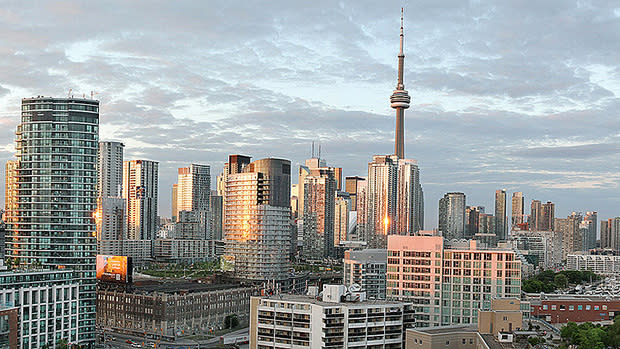Toronto condo prices set to drop as demand wanes: report
Toronto’s condo market could finally see the price dip buyers have been waiting for and sellers dread.
A new report from TD Bank predicts condo prices in Canada’s largest city will fall by an average of 4 per cent this year and next, citing a drop in demand amid a continued building boom.
Rising interest rates are also expected to help cool the market and “chip away at affordability and demand,” the bank says in its report.
“Given the overvaluation in the market, GTA home sales are likely more vulnerable to even small interest rate movements than they have been in the past,” write economist Derek Burleton and Diana Petramala. (For the few who may not know, GTA refers to the Greater Toronto Area).
The economists also cite the “eroding economics of investing in rental properties” as a potential hit to the condo market in the coming months.
“The cost of carrying an average priced condo has been exceeding the rent that can be earned on it,” they say.
While 4 per cent may not sound like a big drop, it’s the forecasted downward direction that economists and investors will be watching closely. There have been predictions for years that Toronto’s condo boom could wind up a bust as the condo craze continues.
It has yet to happen.
As the doomsday calls continue, for better or worse, the downtown skyline is being forever changed.
“Toronto’s skyline of cranes is now about to transform into a skyline of condo buildings,” the TD economists say. “The number of new units scheduled to be completed in the GTA over the next two years is striking at a time when new condo sales are dwindling.”
The bank notes that high-rise condo buildings have accounted for 60 per cent of supply of overall new homes in the GTA since 2011. That compares to 28 per cent in 2000. It says 70,000 units are expected to be built over the next two years, “twice the pace of the historical average.” About 9,000 of those units are still for sale, TD says.
Meantime, the market for single-family homes is hot due to a limited selection.
“The GTA housing market is a tale of several markets with divergent conditions,” the TD economists note.
They say the “rising inventory problem” for condos is more acute outside of the downtown core and the 905 area, “for now.”
Parts of the city that are keeping pace with the market include downtown, North York and the Toronto waterfront.
The average price of a resale condo increased 4.8 per cent in the GTA in February compared to the same month last year, or to $347,222, according to the Toronto Real Estate Board (TREB). In the 416 area code prices jumped 6 per cent to $372,628, and 3 per cent to $290,650 in the 905 area code, which is outside of downtown Toronto.
TREB said new listings of resale condos were up year-over-year, “giving buyers ample choice.”
Sales in the 905 area were up 19.6 per cent, and up 9.6 per cent in Toronto, or 12.5 per cent overall.
“This is in contrast to the listings situation for singles, semis and townhomes, where supply continued to be constrained,” stated TREB president Dianne Usher.
“Some would-be buyers had difficulty finding a home that met their needs.”
Will the condo market crash? Should investors hold out for a suitable single-family home they can afford?
With so much uncertainty in the housing market, and so many inaccurate predictions to date, it’s no wonder so many people continue to rent.

 Yahoo Finance
Yahoo Finance 


